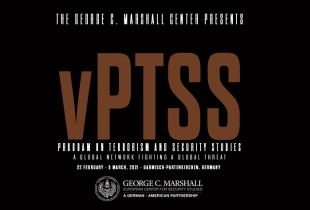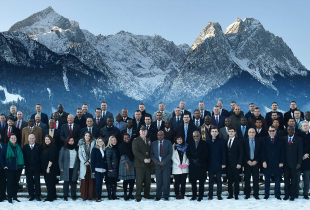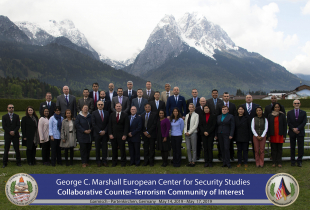
Counterterrorism Course Builds a Global Team before ‘The Bomb Goes Off’
By Christine June
Public Affairs Office
George C. Marshall European Center for Security Studies
GARMISCH-PARTENKIRCHEN, Germany (Aug. 6, 2015) – The premier counterterrorism course spearheaded by the U.S. Department of Defense and German Ministry of Defense graduated 75 participants from 51 countries Aug. 6, adding to a global team of more than 10,500, at the George C. Marshall European Center for Security Studies.
The Program on Terrorism and Security Studies’ graduation wrapped up four weeks of study on terrorism, its origins and more.
At the ceremony held in the center's large plenary hall, Lt. Gen. Ben Hodges, commanding general of the United States Army Europe, emphasized the importance of networking and winning the fight against terrorists during his keynote address to participants before they received their graduation certificates.
“I can guarantee that within five years, you will be talking to someone in this room about a problem you need help with,” Hodges said.
Started in 2004, PTSS convenes twice a year and brings together military and civilian counterterrorism practitioners from around the world to share their experiences and best practices to help countries develop a practical and workable strategy to deal with terrorism in their countries.
Describing PTSS as “a global team against a global threat,” Professor James Howcroft, PTSS 15-7 course director, said this class added to the more than 1,500 PTSS alumni from 131 countries of the Marshall Center’s network of 10,537 alumni from 146 countries.
Howcroft designed the course to highlight four objectives: Understand the Threat; Build Capacity; Build Network; and, Enable Transnational Cooperation.
Course curriculum consisted of lectures from international government and non-government experts on a wide-range of topics dealing with counterterrorism. It also included seminars, case studies, a PTSS-designed exercise, and a field study trip to the Bayerisches Landeskriminalamt (Bavarian state police), Munich SWAT team and the 1972 Olympic Village.
Special Agents Thomas F. O’Connor and Jean K O’Connor, both with the Federal Bureau of Investigation’s Joint Terrorism Task Force, gave a presentation on Evidence and Prosecution July 31. In their presentation, the husband- and wife-team, who are Marshall Center alumni, discussed terrorism and major scene evidence collection and prosecution techniques. Thomas attended PTSS in 2011, and Jean attended PTSS in 2012.
“It’s too late to build partnerships when the bomb goes off,” said Thomas during his presentation. “PTSS builds those partnerships. PTSS is the international form of the FBI Joint Terrorism Task Force, which has 40 agencies working together to combat terrorism.”
The Foreign Terrorist Fighter Exercise was designed for the PTSS, said Tamir Sinai, exercise program manger at the Marshall Center’s College of International Security Studies.
As of mid-2015 it is estimated that 25,000 foreign fighters from as many as 100 countries have made their way to Syria and Iraq, said Dr. Sam Mullins, professor of counterterrorism, during his overview before the exercise on July 20. Mullins added that significant numbers of foreign fighters have already returned to their countries of origin, and there is great concern about the threat that they pose.
“The exercise encourages an in-depth exchange on the different national approaches and best practices of how to deal with this dangerous phenomenon,” said Sinai.
A PTSS 15-7 participant from Nigeria who writes daily reports on the activities of Boko Haram, a terrorist group operating in Nigeria and neighboring countries: Chad; Cameroon; and, Niger, said “I always tried to relate what I learned in class and also from my fellow classmates, to Nigeria and how to use the tools, resources and strategies to tackle Boko Haram. What was really good about this course is that there were 50 other countries represented in my class, and this was very important for networking, as well as a better understanding of various cultures and terrorist groups they are dealing with and how it relates to Boko Haram.”
Participants hailed from: Afghanistan; Albania; Armenia; Bangladesh; Belize; Bosnia and Herzegovina; Botswana; Cameroon; Costa Rica; Croatia; Czech Republic; Dominican Republic; Egypt; Estonia; Georgia; Germany; Greece; Hungary; Ireland; Italy; Kenya; Kosovo; Kyrgyzstan; Latvia; Macedonia; Malaysia; Mali; Malta; Mauritania; Mauritius; Moldova; Morocco; Nigeria; Pakistan; Peru; Philippines; Poland; Romania; Rwanda; Senegal; Serbia; Sierra Leone; South Africa; South Korea; Tanzania; Thailand; Togo; Tunisia; Uganda; United States; and, Uzbekistan.
The mission of the Marshall Center, as a vital instrument of German-American cooperation, is to create a more stable security environment by advancing democratic institutions and relationships; promoting active, peaceful, whole-of-government approaches to address transnational and regional security challenges; and creating and enhancing enduring partnerships worldwide.
The Marshall Center offers eight resident programs that examine complex transnational, regional and international security issues: Program on Terrorism and Security Studies; Program on Applied Security Studies; Program on Security Sector Capacity Building; Seminar on Regional Security; Seminar on Transnational Civil Security; Countering Narcotics and Illicit Trafficking; Program on Cyber Security Studies; and, Senior Executive Seminar.


